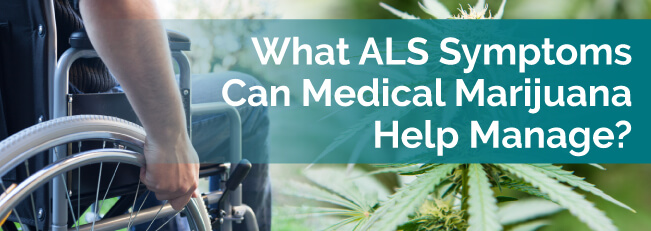
As a disease impacting the central nervous system, ALS manifests in numerous ways that vary by case. Since every person with ALS has a unique experience, doctors can’t prescribe a single medicine that addresses every symptom. So, they must prescribe multiple medications, increasing the cost and number of medications to handle for the patient.
What if there were a medicine that could act as a treatment for multiple symptoms? It might be closer than you think. The more we research the medical application of weed, the more uses we find for it. Medical marijuana addresses many ALS symptoms, making the patient’s experience easier to handle.
Amyotrophic lateral sclerosis damages your brain and spinal cord, resulting in cell death in your nervous system. As a lethal neurodegenerative disease, its symptoms slowly grow worse until the disease eventually takes the lives of each patient. We don’t have a cure for ALS, so doctors still search for one today.
Patients with ALS mainly experience symptoms related to motor and cognitive functions. Every patient has a different experience with ALS involving symptoms based on the area where the cell death occurs. ALS symptoms greatly interfere with the patient’s ability to do daily tasks, reducing their quality of life.
Spasticity, or muscle spasms, occur in every case of ALS. They often cause a lot of pain and make it harder for the patient to move and conduct other necessary tasks. Doctors usually treat muscle spasms with muscle relaxants, which have problematic side effects.
Preliminary research shows cannabis has great promise for serving as an alternative to prescription muscle relaxants. Having more options for ALS treatment always improves the medical experience.
The muscle tension and spasticity resulting from ALS often cause chronic pain. If the pain gets severe enough, doctors will prescribe prescription painkillers. But, stronger painkillers can damage your liver and cause addiction.
Most research on cannabis in a medical context centers around its pain-relieving potential. The studies we have point to marijuana serving as an efficient pain remedy with less damage and possibility of dependency.
Some patients with ALS have reduced appetites. When you have a chronic illness, getting the right nutrients and staying at a healthy body weight help you recover. In the case of ALS, staying as healthy as possible can help slow down the condition’s progression.
Marijuana works as an appetite stimulant, making it easier for ALS patients to eat. We may joke around about the “munchies,” but in this scenario, it’s a health benefit that can increase someone’s quality of life.
ALS can change the way your body produces saliva and mucus, often increasing production of the two substances. When left untreated, the extra saliva production can cause drooling, which is especially uncomfortable for patients without enough mobility to swallow or wipe it away.
We generally consider the dry mouth some cannabis patients experience a negative side effect of the medicine. But in the case of ALS patients, it helps them curb the amount of saliva they produce. Less saliva leads to more dignity and comfort for the person battling this disease.
Patients with ALS can experience emotional changes from the condition. They sometimes develop anxiety and depression due to the stress of having a lethal, incurable condition. Regardless of the cause, emotional issues substantially decrease a patient’s quality of life.
Antidepressants and anti-anxiety medications can have wildly different results — not to mention the high risk of dependency and addiction. Sativa strains can substitute these drugs by providing users with extra energy and an elevated mood. In a case of extreme anxiety without depression, indica strains sedate and relax the user.
Did you know we have a library full of information about conditions eligible for legal marijuana medicine? Our guide on ALS will give you the details you need about medicating ALS with cannabis.
As always, we recommend finding a marijuana doctor near you to discuss medical cannabis with before you try it. You can also speak with the staff at your local dispensary.